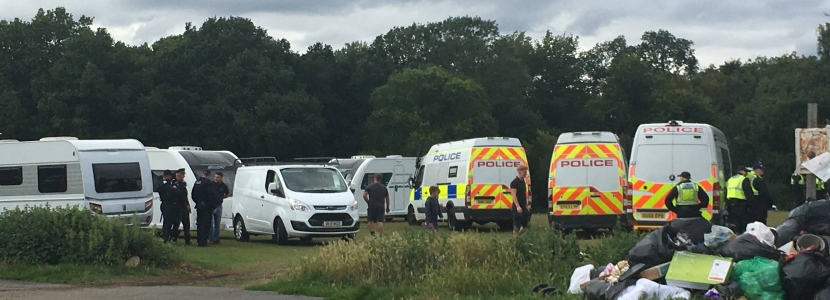
This article was originally published on Conservative Home on 16th August 2019
Dealing with illegal (or unauthorised) encampments is not about stigmatising a nomadic way of life or criminalising a section of the population. It is about dealing with a serious problem of anti-social behaviour and criminality that in some quarters is overlooked or downplayed for fear of being accused of discrimination.
Nevertheless, if you are a teacher organising a sports day on the school field, or the volunteer helping with the village fete, the arrival (illegally) of several vehicles in the area allocated for the coconut shy is a real problem that people expect the police to deal with.
The law, as it stands, is not on the side of the police in meeting the public’s expectations. The powers that police officers have to move unauthorised encampments are limited and responsibility often falls to the landowner. If that is the local authority, they may have the resources to deal with the problem, but often it is a private landowner who cannot afford or is intimidated to go to court. It’s perfectly likely that criminal damage may have occurred, perhaps cutting a lock to enter the site, but there is often no evidence about which individual is responsible to justify an arrest. There may be numerous other reports of crimes or anti-social behaviour in the area. Undoubtedly some will be exaggerated or repeated rumour, but genuine victims will also be scared to give evidence to the police to progress action. After a few days of apparent inactivity by the authorities, the current residents of the village green will move on, leaving behind a costly clean up and a bitter memory within the settled community.
All of this may sound like a reiteration of the excuses used time and again, but it is really the diagnosis of the problem for which we must find a solution.
Like our new Prime Minister, I am an optimist, and once the more immediate challenges facing the Government are dealt with, I hope that he will enthusiastically throw his full and energetic weight behind changes to the law in this area. Following a consultation the Government had earlier this year, they promised to amend the legislation relating to illegal encampments. This is a real opportunity to get the balance right and to deliver the powers that are needed. I have been talking to local authorities across the country who have been taking different approaches to the problem. I have also been in contact with the Garda in the Republic of Ireland who work under a very different legal framework to see what lessons can be learned.
Some of the changes outlined by the Government should be welcomed, but I believe the changes can go further. This is a once in a lifetime opportunity to tackle an issue which is a persistent complaint from residents across the Thames Valley and I am sure across the country. Currently, the police have to rely on loosely framed powers (Sections 61 and 62 of the Criminal Justice and Public Order Act 1994) or hope that there are other criminal offences that can be used. This is inadequate – and stronger powers are needed both for land-owners and the police. I have no desire to prevent people from having a perfectly legal nomadic lifestyle, but the law must apply to all, equally and fairly.
As with all sections of the community, there are criminal elements within groups of travellers but the police cannot and should not tar everyone with the same brush. In the same way that if there is some criminal damage in my road, I would not expect a whole family to be arrested if one member of that family is suspected, the travelling community should expect fair and equal treatment.
Until the law is changed the police will continue to fail in meeting the public’s expectations, not through lack of endeavour but through inadequate powers. The solution isn’t limited to the criminal law; housing authorities have a role to play as well, as is apparent in Ireland.
I am a pragmatist, rather than an ideological politician, but if the Conservative Party believes in anything it should be private property and the liberty of the individual. It is perfectly possible to frame the law so that it respects the freedom of individuals to move around the country freely, whilst respecting the rights of landowners. The right to roam is not the right to occupy any piece of land you choose.
This is a problem for police forces up and down the country and Police and Crime Commissioners will be at the forefront of ensuring the law is changed where needed. There is a solution to balance the needs of all communities and it is a solution that a Conservative Government can deliver.


